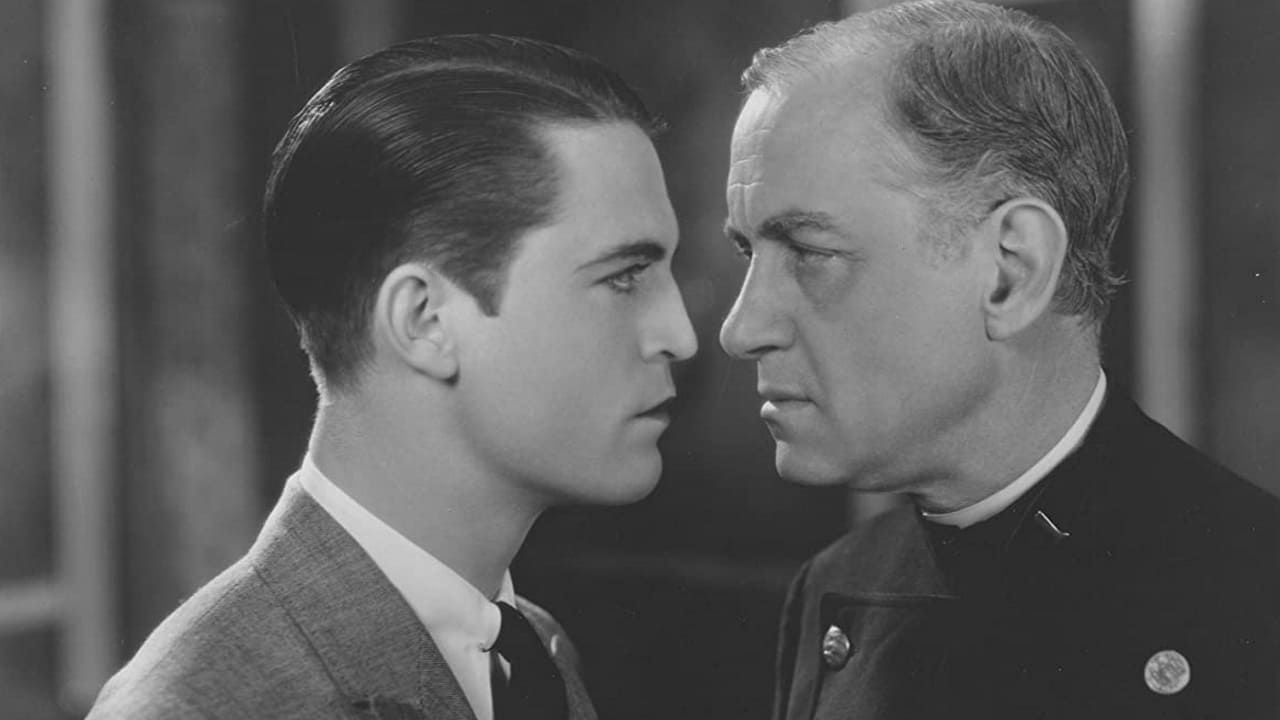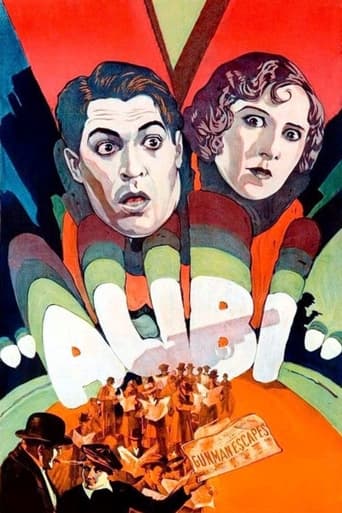

Aside from wine and cheese, not all things age well. Like a gallon of milk, over time this film has started to sour--thanks mostly to changing and improving film-making. In fact, had this film been made just a year or two later, it would have been much easier to sit through. Unfortunately, this can be said of most films made in 1929. This was a transition period in which silent films were changing to sound and the technology frankly wasn't very good. Plus, since this was all new territory, the films tended to be very, very stagy--mostly because the sound men had no idea how to compensate for people as they moved away or towards microphones. This is all painfully obvious with ALIBI. Some characters are loud and easy to understand, others appear as if whispering and others have their voices fade as they move. Additionally, the film looked a lot like a play in parts as they used very long single shots with few inter-cut scenes. Plus, it was obvious some scenes were originally filmed as silent because the standard 24 frames per second (used for all sound films) made these segments seem like people were moving too quickly (as silents were filmed anywhere from 16 to 22 frames per second).As for the plot, it's a crime drama with a lot to like and a lot to hate. I liked how, at times, the film was rather gritty--particularly in the last few minutes (the building scene at the very end was amazingly tough and memorable--one of the best death scenes in film history). Some may also like how the cops in the film pretty much ignore the Bill of Rights--and weren't above slapping a confession out or someone or threatening them with guns! Some may also be appalled, but this is truly Film Noir-like in its sensibilities. But, the plot also is really stupid at times--with some of the dumbest criminals you'll ever see in films, clichés galore and a very sappy death scene that will practically make you cringe.Now as for the plot. For 1929, it was really quite good. If we'd had IMDb and the internet back then, a score of 7 or 8 wouldn't be unexpected. However, by today's standards, I'd have a hard time giving it anything more than a 2 or 3. So, splitting the difference, a 5 seems appropriate--for the time, a very good film but when seen today, it's terribly old fashioned and dull.
... View More1929 was a beginning for talking picture entertainment. A few of the motion pictures made in 1929 were really good, i.e., The Broadway Melody (1929). This one, even though it has a couple of good moments, is terrible and nearly unwatchable. The reason for this is the direction and the limitless periods of silly time between lines and scenes. You find yourself talking to the characters and asking, well, OK, what?, as they stare at each other waiting to deliver the next line. Chester Morris, Eleanor Griffith, and Mae Busch of Laurel and Hardy fame are fine in their own right. The 1929 music is just fine too. But, I couldn't finish watching the film because of Roland West's absolutely silly direction and lack of skill in the medium. This one is a loser. So was Roland West.
... View MoreIt's hard to watch this film out of the context of 1929 when it was first released. The Idea of a talking moving picture was still a novelty. In fact this film was released simultaneously with a silent version for those theaters that had yet to convert to sound. That said the biggest problem with this film is that it doesn't seem to know which side of the law it wants to side with, first it makes the cops out to be, I don't want to say bad guys, so let's just say unlikable. Then towards the end it's creates the criminal as well lets also say unlikeable. The problem is that it has one of the worst transitions I've ever seen. Again one has to go back to the time in which the film was made, this at the height of Al Capone and the bootlegging racketeering of that period and just before the stock market was to crash in October. Today many people see the police forces in a dualistic light, as being both there to serve and protect, and as villains with a corrupt politicized agenda. With this the film should hold up, but it doesn't. The main problem is that the characters are so flat and unlikable. It's hard to care one iota about who lives and who dies. In the end it's a film about jerks, plain and simple. I doubt however that when the film was released the audiences of the day had this same feeling. The idea of beating or threatening a criminal suspect was most likely looked at as not only acceptable but necessary. It's hard to come down on the film one way or the other, as I have mixed feelings about it as a whole. With that said the ending is one of the most anticlimactic endings I've seen since Chinatown. In that film, the whole concept of the movie was based around this idea of the inevitable of the outcome. Alibi fails in that it doesn't seem to hold on to any one concept for too long, instead making leaps that just feel awkward and clumsy. I think that what most likely amazed the audience was the fact that Alibi is one of the first films to start to play around with the sound design, having a moving camera and dancing and sound all working simultaneously creating a spectacle that most film goes of the day had never seen before. I can't say stay away from this film as it has it's place in the pantheon of cinema history, in part because it was nominated for Best Picture at the academy awards. However, if you're just looking for a classic film to watch on a Saturday night, you might want to steer clear of this one.
... View MoreFor its time, Alibi was probably groundbreaking with a crime world never truly seen before. That's probably why it was nominated for Best Picture in 1929. Today, people just see it as one of those creaky gangster movies from the early days of sound and pass it up thinking that it won't hold their attention one bit. I'm here to prove those people wrong.For one thing, the story is what usually makes a movie for me. A film has to have a good story to get me to see it. Well, if you like any type of crime related movies, that's all you need to know. Even if you aren't a fan of crime dramas, this film will interest you with the way it captures the human spirit and the way it can deteriorate very quickly in times of stress.Obviously that last bit can only be performed by great actors and actresses with natural talent. That's what you get with this film. Chester Morris deserved the Oscar he was nominated for, even if you just see his final scene you'll give it to him for his shocking portrayal of a rotten gangster.I think that it's Regis Toomey, a forgotten star, who really shines in this film though. His performance as a drunk with something to hide is really quite remarkable. If they had Supporting categories back then, he'd have been a shoe-in.I hope I've convinced you enough to check out Alibi because it's actually a really good film. I recommend it if you're looking for a good crime drama that will hold your attention, which shouldn't be hard since it's not a very long movie. Enjoy it, if you get the chance to see it.
... View More